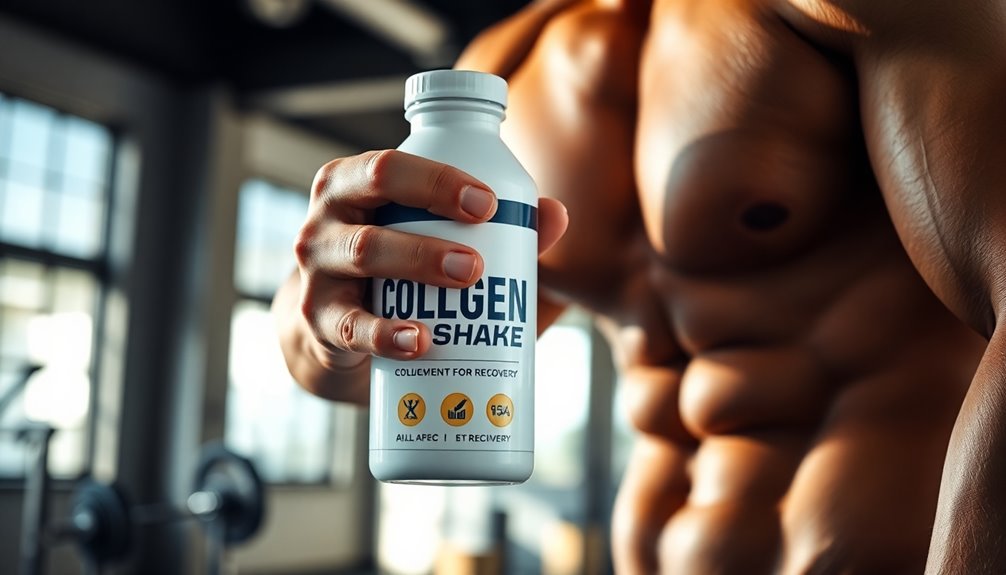Boost your athletic performance and recovery with collagen, an essential protein for muscle strength and joint health. As you push your limits, collagen aids in muscle repair post-workouts, maintains tendon elasticity, and speeds up injury recovery. Enhancing muscle mass and bone density, collagen supports overall strength and endurance. Consider incorporating collagen-rich foods like bone broth and fish skin into your diet for natural synthesis. Collagen supplements further optimize muscle tissue repair, joint mobility, and the healing process for sprains and tears. Explore the benefits of collagen supplementation for athletes seeking peak performance and faster recovery times.
Key Takeaways
- Collagen aids in muscle recovery, repair, and supports joint health for peak athletic performance.
- Enhances muscle strength, endurance, and protects connective tissues crucial for athletes.
- Speeds up injury recovery, promotes muscle mass, bone density, and tendon elasticity.
- Supports skin hydration, elasticity, and overall strength for improved athletic performance.
- Collagen supplementation optimizes performance, speeds up recovery, and boosts overall fitness levels.
What Is Collagen and Its Role?
Collagen, a pivotal protein in your body, plays a significant role in maintaining the health of various tissues like skin, cartilage, and connective tissues. It's vital for your muscles, joints, and overall body function. As an athlete, you rely heavily on your body's ability to recover and perform at its peak.
Collagen is essential for supporting muscle strength, joint health, and overall recovery. This protein contains eight essential amino acids that act as building blocks for your body, ensuring structural integrity and resilience.
With age, your body's natural collagen production decreases, affecting your athletic performance and recovery. This decline emphasizes the importance of collagen supplementation for athletes. By incorporating collagen into your routine, you can enhance muscle strength, improve endurance, protect your joints, and promote overall bone health.
This supplementation can also help decrease the risk of injuries, allowing you to push your limits and achieve your athletic goals with greater ease.
Why Athletes Need Collagen
For athletes aiming to optimize their performance and recovery, incorporating collagen into your daily routine can be a game-changer.
Collagen is essential for muscle recovery, helping repair and rebuild muscle tissue after intense workouts or injuries like sprains and tears. Not only does collagen supplementation support muscle strength, but it also plays a pivotal role in maintaining joint health, ensuring mobility and flexibility for peak athletic performance. Collagen supplements are particularly beneficial for individuals, providing the necessary structural support for the body to function at its best. This is especially vital for men, as they often partake in activities that put added stress on their muscles and joints, such as weightlifting or sports. By incorporating collagen into their wellness routine, men can harness its benefits to support muscle recovery, joint health, and overall vitality for men.
By promoting efficient injury recovery, collagen reduces downtime, allowing you to get back to training faster and perform at your best. Additionally, collagen aids in building muscle mass, improving bone density, and enhancing tendon elasticity, all of which contribute to better overall athletic performance.
With collagen supporting skin elasticity and hydration, incorporating it into your regimen can help you achieve your fitness goals while keeping your body strong and resilient.
Benefits of Collagen for Performance
Enhancing athletic performance with collagen is a smart choice for athletes looking to optimize their physical abilities. Collagen supplementation plays an important role in supporting muscle health, joint health, and overall performance enhancement. By incorporating collagen into your routine, you can protect and promote muscle growth, maintain muscle mass, and improve recovery from common injuries like sprains or muscle tears that athletes often face.
Additionally, collagen helps in maintaining the elasticity of tendons and connective tissues, which is particularly beneficial for endurance athletes dealing with stress on joints and cartilage.
As an athlete, you can experience enhanced muscle mass, better bone density, and increased performance levels through collagen supplementation. This natural protein not only aids in muscle protection but also contributes to faster recovery, allowing you to push your limits without compromising on your body's health.
Natural Sources of Collagen
To optimize your physical abilities as an athlete, understanding the natural sources of collagen is vital. Collagen-rich foods like bone broth and fish skin provide essential building blocks for collagen synthesis. Incorporating vitamin C, proline, and glycine into your diet can further support your body's natural production of collagen. By consuming these natural sources rich in collagen, you can enhance your overall health and fitness levels.
The collagen peptides found in bone broth and fish skin play a pivotal role in promoting the body's ability to synthesize collagen, leading to various benefits for athletes. Boosting your collagen intake through these natural sources can aid in improving performance and speeding up recovery times.
Embrace these collagen-rich foods and nutrients to empower your body's collagen synthesis and elevate your athletic performance to new heights.
Supplementing With Collagen for Athletes
Supplementing with collagen can be a game-changer for athletes looking to optimize their performance and recovery. Collagen supplements support muscle tissue repair, aiding in faster recovery after intense workouts. Not only does collagen enhance joint health, but it also boosts mobility and elasticity, essential for athletes pushing their limits.
For those dealing with injuries like sprains or muscle tears, collagen can speed up the healing process. Additionally, increasing muscle mass and improving bone density are extra benefits that come with collagen supplementation.
Collagen for Injury Recovery
Collagen’s impact on injury recovery is an important benefit for athletes aiming to maintain peak performance levels. Adding collagen supplementation to your routine can help you recover faster by stimulating tissue repair and regeneration in tendons, ligaments, and muscles. This is essential for athletes who need to bounce back quickly after an injury. Collagen benefits for postpartum recovery are also noteworthy, as the protein plays a crucial role in repairing the body’s connective tissues and skin after childbirth. By incorporating collagen supplementation into their postpartum routine, new mothers can support their body’s natural healing process and promote faster recovery. Additionally, collagen can aid in restoring elasticity to the skin, which may have been stretched during pregnancy. This makes collagen a valuable asset for women seeking to regain their pre-pregnancy strength and overall well-being.
By increasing your collagen intake, you can accelerate recovery post-surgery and during rehabilitation, getting you back to your training and competition sooner.
Incorporating collagen into your regimen not only aids in healing but also plays a critical role in injury prevention. It reduces joint pain, improves joint health, and supports faster recovery times for athletes. Whether you're dealing with a minor strain or a more serious injury, collagen supplementation can support your body in the healing process.
Effectiveness of Collagen for Athletes
For athletes aiming to enhance their performance and recovery, the effectiveness of collagen as a supplement is a topic of growing interest and significance. Collagen offers numerous benefits for your health and athletic endeavors.
Studies have shown that collagen supplementation can improve joint health, reduce joint pain, and support tendon elasticity, essential for maintaining best muscle tissue health. Additionally, collagen aids in muscle repair and recovery, facilitating a faster healing process after intense workouts.
By incorporating collagen into your routine, you can potentially prevent injuries and strengthen connective tissues, ultimately enhancing your athletic longevity. This protein plays a crucial role in collagen production, which is necessary for maintaining healthy muscles and tendons.
Frequently Asked Questions
Does Collagen Improve Athletic Performance?
Yes, collagen can boost athletic performance. It helps with joint health, muscle repair, and endurance. Studies show it reduces joint pain, enhances bone density, and speeds up recovery. Collagen is key for athletes looking to excel.
Does Collagen Help With Workout Recovery?
Yes, collagen helps with workout recovery. It reduces muscle soreness, speeds up recovery time, and supports joint health. Including collagen in your post-workout routine can enhance performance and minimize the risk of injuries. Try it out!
Is Collagen a Ped?
Collagen is not a PED; it's a natural protein in your body. Athletes often use collagen for joint health, recovery, and injury prevention. It isn't a performance enhancer but boosts overall well-being. It's legal and widely accepted in sports.
Which Collagen Is Best for Sports?
For sports, choose collagen based on your needs. Marine collagen boasts high bioavailability. Bovine collagen offers type I and III for muscle, bone, and skin. Organic Bone Broth and Vegan Collagen are natural. Collagen+ 4Endurance Pro is athlete-specific.
Conclusion
To wrap up, incorporating collagen into your diet as an athlete can help enhance your performance, speed up recovery, and prevent injuries. Whether through natural sources or supplements, collagen offers numerous benefits for those with an active lifestyle. So, if you want to take your athletic abilities to the next level, consider adding collagen to your routine.


